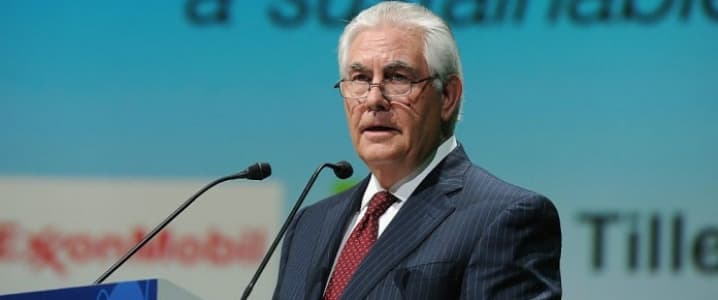Former oil executive Rex Tillerson’s history of politically damaging oil dealings in the Middle East could jeopardize the future of a united Iraq as he assumes the position of U.S. Secretary of State with the inauguration of President-elect Donald Trump on January 20th, pending a Senate confirmation vote.
Under Tillerson’s management in 2011, Exxon Mobil approved oil contracts with Erbil, the capital of the Kurdish Regional Government (KRG), which spans almost 80,000 kilometers in northern Iraq, provided disputed territories are included in the calculations. These lands hold an estimated 45 billion barrels of recoverable oil.
This strategic business move, which helped insulate the American oil major from the financial effects of the collapse of $25 billion in development contracts for West Qurna it had signed with the Iraqi government in 2009, affirmed the independent vision the KRG had been pushing in its domestic and international political agenda.
"Part of the process of building our region has to do, of course, with dealing with oil, signing contracts, negotiations with various countries," Fuad Hussein, chief of staff to Kurdistan's president, told Reuters in 2014. The Exxon deal represented "a big victory for [the Iraqi Kurds]” because it affirmed the group’s economic ascension, apart from Baghdad’s volatility since the U.S.-led toppling of Saddam Hussain’s authoritarian regime in 2003.
However, the new agreements with Erbil undermined the U.S.’ official position of supporting a unified Iraq and irked neighboring Turkey, which, to this day, vehemently opposes Kurdish militant factions pushing for political self-determination for those who belong to the minority group. Related: U.S. Oil And Gas Jobs See First Gains In 2 Years
As Reuters reported in 2014, Baghdad has only been able to maintain its gravity as the central gatekeeper for multinational oil companies looking to drill within Iraqi territory by holding hostage the nation’s largest reserves in the south. If energy firms truly longed for a footprint in Iraq’s southern assets, they would have to avoid Erbil and fully embrace the internationally recognized regime in Baghdad.
Oil concessions in the coveted fields became official in 2009 and 2010, but continued instability and tough contractual terms made profitability possible in rare conditions, causing several multinationals, including Exxon, to lose interest. Soon, Exxon began sending out feelers to the KRG after Tillerson met with those in-the-know regarding the geopolitical realities of investing in war-torn Iraq.
To Ali Khedery, a well-connected American of Iraqi descent who had spent decades in Baghdad, Exxon needed to look north. The Shi’ite militias, neo-Baathist insurgents, al Qaeda sleeper cells and Iranian troops who occupied areas surrounding the southern fields would cause security costs to skyrocket – especially if the domestic political structure collapsed.
Areas under the KRG’s control were “more peaceful, more predictable, and overwhelmingly pro-American,” Khedery advised at the time.
Talks ended with Exxon in control of six drilling blocks located in various parts of the autonomous region: one close to Turkey, another near Iran and three just on the border between Kurdistan and the rest of Iraq – a fact that jeopardized fragile domestic relations after news of the deal leaked.
Nouri al-Maliki, the Prime Minister of Iraq at the time, wrote furious letters to the Obama administration, demanding the White House push one of the most powerful American corporations to abandon the freshly minted deals. Related: World Bank: Trump To Boost U.S. Economic Growth And Commodities
An anonymous American diplomat told Reuters that Exxon had given the State department less than a day’s notice before the signing of the contracts to deal with its political fallout. Unsurprisingly, U.S. Ambassador to Iraq James Jeffrey was “livid” after hearing the news, promptly dropping a few “F-bombs” as a major cornerstone of the American vision of a unified Iraq stood haphazardly on one leg.
Tillerson’s savvy business maneuvers served his company and shareholders well, although it was at the expense of the U.S. government’s long-term goal of leaving Iraq in one piece. The feasibility of such a goal overall is debatable, however, the oil executive’s strategy shows an indifference to political and social interests, in contrast to expected norms of corporate social responsibility.
Before Tillerson’s Senate confirmation hearings began last week, he promised the State department to sell off 611,000 additional Exxon shares before assuming his sensitive position in the incoming Trump administration. Still, he is set to receive $180 million as part of a retirement package after he leaves the oil giant after 10 years as CEO.
ADVERTISEMENT
The defeat of the Islamic State (ISIS) has given the KRG fresh political capital to leverage in post-ISIS negotiations regarding the (potentially) independent future of the region. How will Tillerson manage to balance the effects of deals he had arranged just five years ago with the long-standing position of the American government affirming a single Iraq?
By Zainab Calcuttawala for Oilprice.com
More Top Reads From Oilprice.com:
- Oil Prices Running Out Of Reasons To Rally
- Seismic Industry Still Reeling From Oil Price Bust
- Oil Slips And Bounces Back After EIA Reports Significant Builds Across The Board



















The Kurd's deserve their own nation much more than other countries like the feckless Palestinians. Israel is not going to commit suicide for anyone.
Iraq is not viable as a nation in the long run.
It is split three ways similar to India-Pakistan-Bangladesh in 1948.
In my opinion, with SOSUS Rex Tillerson's economic understanding of the ME regional dynamics, we will no longer maintain the blinders to the disastrous death spiral the US State Department has foisted upon failing states Egypt, Iran, Iraq, Libya, Yemen, and the House of Ibn-Saud.